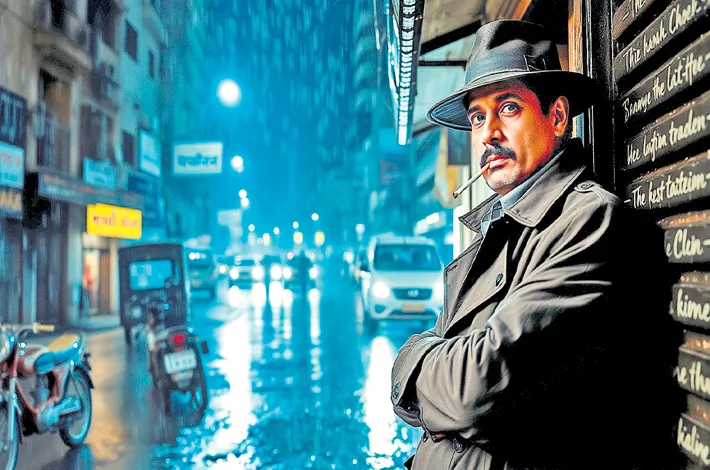Murder in Arah
19-09-2025 12:00:00 AM

In the quiet town of Arah, nestled between rolling hills and a sluggish river, the air carried a chill that had nothing to do with the autumn breeze. It was 1953, and Arah was the kind of place where everyone knew everyone else’s business, or so they thought. Detective Samuel Kane, a wiry man with sharp eyes and a sharper mind, had returned to Arah after a decade in the city, seeking peace. Instead, he found a mystery that would unravel the town’s sleepy facade.
It began with a scream, piercing the stillness of a foggy October night. The sound came from the old Whitaker house, a crumbling relic on the edge of town, long abandoned since the family’s patriarch vanished twenty years prior. Kane, now the town’s only detective, was summoned by a breathless boy who’d heard the cry while sneaking a cigarette behind the mill. By the time Kane arrived, a small crowd had gathered, their faces pale under the dim streetlights.
Inside, the air was thick with dust and the metallic tang of blood. In the parlor, sprawled across a moth-eaten rug, lay Clara Whitaker, the last of the family line. Her throat was slashed, her eyes wide with terror, and a strange symbol—a crooked star within a circle—was carved into the floorboards beside her. Kane knelt, his gloved fingers tracing the symbol. It wasn’t random; it felt deliberate, ritualistic.
Sheriff Dobbs, a heavy-set man with a penchant for chewing tobacco, arrived and declared it a robbery gone wrong. “Drifters,” he muttered, spitting into the dirt. “They come through, cause trouble, move on.” But Kane wasn’t convinced. Clara’s jewelry was untouched, her purse still clutched in her hand. This wasn’t about money.
Kane began with the townsfolk. Arah was small, barely 2,000 souls, and secrets didn’t stay buried long. At the diner, Mabel, the waitress with a memory like a steel trap, recalled Clara visiting the day before, nervous and clutching a letter. “She didn’t say much, but she kept looking over her shoulder,” Mabel said, pouring Kane coffee. “Like someone was watching.”
The letter was the first lead. Kane found it in Clara’s bedroom, tucked inside a Bible. It was unsigned, written in a shaky hand: Meet me at the house. Midnight. The truth about your father. Kane’s gut twisted. Clara’s father, Ezekiel Whitaker, had disappeared in 1933, leaving behind rumors of debts and dark dealings. Some whispered he’d been involved in something occult, though Arah’s God-fearing folk dismissed it as nonsense.
Kane’s next stop was the town archive, a dusty room in the library overseen by Miss Eleanor, a spinster with a knack for remembering every scandal. She handed Kane a file on Ezekiel, her lips pursed. “He was trouble,” she said. “Mixed up with a group called the Order of the Crooked Star. They met in secret, out by the old quarry.” The symbol from the crime scene flashed in Kane’s mind. He pressed Eleanor, but she clammed up, crossing herself.
The quarry was a half-hour’s walk, overgrown and forgotten. Kane found signs of recent activity—cigarette butts, a broken lantern, and, hidden in the underbrush, a knife with dried blood. He bagged it, his pulse quickening. Back in town, he sent the knife to the city for analysis, knowing it’d take days. Arah wasn’t equipped for forensics, and Sheriff Dobbs wasn’t keen on “fancy science.”
That night, Kane staked out the Whitaker house. The fog was thicker, the town silent. Around 1 a.m., a shadow moved near the back door. Kane followed, his revolver drawn, heart steady despite the eerie quiet. The figure was hooded, slipping inside. Kane crept closer, but a floorboard creaked underfoot. The figure bolted, vanishing into the mist. All Kane found was a scrap of paper with the same crooked star symbol, and a name: Josiah Black.
Josiah was Arah’s recluse, a former preacher who’d turned to drink after Ezekiel’s disappearance. Kane found him in a shack by the river, reeking of whiskey. Josiah’s eyes widened at the symbol. “You don’t understand,” he slurred. “The Order… they wanted power. Ezekiel promised them something ancient, something evil. When he couldn’t deliver, they turned on him.” Josiah admitted to writing the letter, hoping to warn Clara about the Order’s return. “They’re still here,” he whispered. “In Arah.”
Kane pieced it together. The Order of the Crooked Star, a cult Ezekiel had led, was active again. Clara’s death was no robbery—it was revenge, or a ritual. But who was left? Kane cross-referenced names from Eleanor’s files with townsfolk still in Arah. One stood out: Thomas Reed, the town’s banker, a man with a spotless reputation and a penchant for late-night walks.
Kane confronted Reed at his office. The banker was calm, too calm, his smile thin. “You’re chasing ghosts, Detective,” he said. But Kane noticed a ring on Reed’s finger—a crooked star etched in gold. When pressed, Reed’s composure cracked. “You can’t stop it,” he hissed. “The Order is eternal.” Kane didn’t hesitate; he cuffed Reed, but not before the banker lunged, a hidden blade grazing Kane’s arm.
At the station, Reed confessed. The Order had never disbanded. Clara had been digging into her father’s past, uncovering their secrets. They killed her to silence her, the symbol a warning to others. Reed named three others—local men Kane had known his whole life. The arrests shook Arah to its core.
The knife’s analysis came back, confirming Clara’s blood. The case was closed, but Kane felt no victory. Arah’s idyllic surface had cracked, revealing a darkness that lingered in its bones. As he stood by the river, watching the fog roll in, Kane wondered how many other secrets the town still held. The crooked star, he knew, would haunt his dreams.








